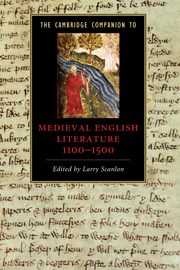16 - Margery Kempe
from Part II - Authors
Published online by Cambridge University Press: 28 November 2009
Summary
Margery Kempe was born c. 1373 in prosperous circumstances in Bishop's Lynn (now King's Lynn) in Norfolk. Her father was a prominent burgess and served five times as mayor. Although she traveled widely, on pilgrimage, and for other spiritual purposes, she resided all of her life in Lynn, where she married and raised children, dying c. 1440. Modern scholars have settled upon the term “autobiography” to describe the genre to which The Book of Margery Kempe belongs. This seems quite sensible given that Margery Kempe is both the Book's author - in collaboration with her scribes - and its subject. Further, the work's autobiographical aspects extend beyond subject and authorship to structure and style. For example, although the narrative is not strictly chronological, it is loosely arranged around events in Margery's life. Similarly, although it is told from third-person perspective rather than first (Margery refers to herself as the “creatur”), it reflects the author's point of view, offering moral and personal commentary on her experiences. Finally, the Book's frequent use of direct discourse makes it seem as if Margery “re-speaks” her own words for the reader's benefit. As a genre, autobiography holds out the promise that we can know and feel what the author experienced - what she was really like. Modern enthusiasm for Kempe's Book suggests that it is a promise many readers feel her Book keeps.
Yet as fitting as it is for us to think of the Book as autobiography, use of the term probably tells us more about modern interests and inclinations than it does about medieval ones. Margery Kempe and her scribes never used the word to describe her writing: they could not since it did not come into use until the late eighteenth century. Nor do they choose what would seem to be the closest Middle English approximation, “life.” Instead, they refer to her work as, straightforwardly, her “book” – a long piece of writing – or, more particularly, her “tretys.” In Middle English, “treatise” could be a synonym for book, but it was also frequently used to indicate that a text addressed a particular subject of study.
- Type
- Chapter
- Information
- The Cambridge Companion to Medieval English Literature 1100–1500 , pp. 217 - 228Publisher: Cambridge University PressPrint publication year: 2009



